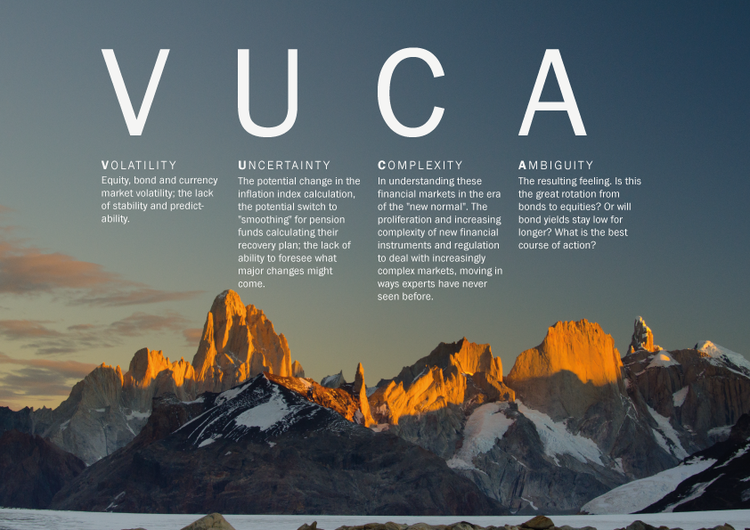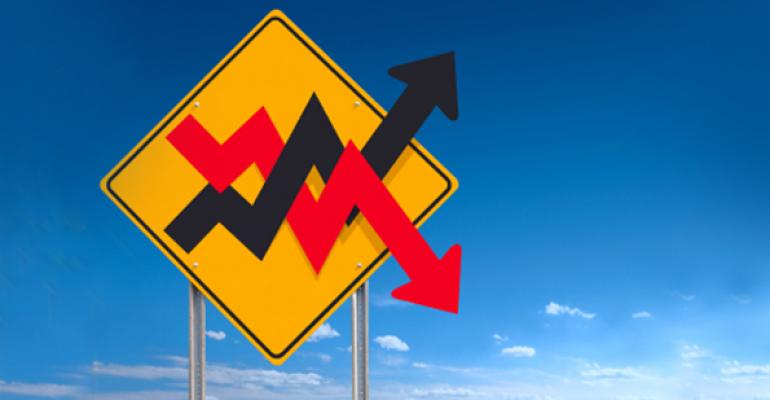We have been accustomed to changes for centuries, and the Greek philosopher Herácrito warned us in the sixth century BC that nothing is permanent except for change, also expressed as nothing is eternal, only change remains.
The difference with our days is that now the changes are vertiginous, absolutely unpredictable and extremely complex. Previously, in other articles I have introduced the acronym but now I want to share their meaning and why? ... should be taken into account today.
VUCA is the acronym in English used to describe environments characterized by volatility, uncertainty, complexity and ambiguity. The term began to be used in the nineties by American soldiers and later began to be used to describe the context in which organizations operate, and today the growth of companies is subject to it.
V = volatility, associated with the nature and dynamics of the changes, as well as the speed with which they occur.
U = uncertainty, related to the lack of predictability, the increase of unforeseen situations and not knowing with certainty how the factors that influence the activity will be developed.
C = complexity of the problems, confusion of the solutions and confusion that characterizes the environment in which the organizations operate.
A = ambiguity associated with the lack of clarity that gives rise to diverse interpretations. The same conditions cause different consequences.
And in this sense we find information that leads us to observe that the future will be even more changeable in every sense. And for this I present some data to analyze how our environment is changing:
- Gartner anticipates that, within 10 years, the machines will perform 30% of the jobs that humans do now.
- According to a study by the University of Oxford, half of the current jobs will disappear during the next 20 years. And we are not referring to the loss of jobs but to the "functional jobs" in themselves.
- 70% of today's babies will work in professions that are not yet known, for the simple reason that they have not yet been invented or created.
- The main threats to your company can come from other industries and other economic sectors.
- The world's leading company in the transport of people by road does not have a single vehicle of its property and is completely digital (Uber).
- The world's leading hotel management company does not have any hotels or similar establishments and is absolutely digital (Airbnb)
- The Collaborative Economy is changing many traditional rules of the game, dislocating many conventional operators.
- Digital disruption is causing changes whose future significance we can only glimpse timidly. And this without going into depth about the consequences of using Big Data, the Internet of Things, of Business Intelligence applications.
Do you identify the context in which your sector operates as a VUCA environment?
Orders for before yesterday. Service requests for now. What seemed one thing has turned out to be another. Every day things change without knowing where. The demands are greater and resources are limited.
Sectors such as services, technology, industry, banking and many others operate in VUCA environments in which the rules of the game have changed. Flexibility and adaptation are some of the new challenges faced by companies and professionals because this reality, beyond fashion or something temporary, is here to stay.
"It is not the strongest species that survives but the one that best adapts," Darwin.
I quote Bob Johansen, author of "Leaders make the future", the VUCA environment should be managed, by contrast, from another VUCA:
- a) Address the Volatility and the hyperconnection of variables with a vision of the future.
- b) Facing Uncertainty with Understanding, knowledge, understanding and empathy.
- c) Facing Complexity, look for clarity, simplicity and simplicity in execution.
- d) Overcoming Ambiguity with Agility. The ability to react to events is more important than planning itself.
These characteristics of the environment generate great risks, but also open the door to great opportunities, to different ways of doing things; In short, innovation in business models that, in turn, feed back the complexity, ambiguity and uncertainty of the environment. The factors of change are not exogenous to the environment; the change that entails is really endogenous, it is the result of innovation, especially in business models.

In these competitive circumstances, traditionally cut strategic planning is dead. Anticipating the future is complicated ... except if we are able to create a new future, to be agents of change, to innovate ourselves in the business model. Strategic planning is not operative in these environments, but strategic thinking is fundamental for orienting oneself in the VUCA environment. In the end, the strategy we carry out will define our "new" business model. Therefore, the key is to compete adequately with the business model.
Tesla is a great example of what we are saying. In 2006, (12 years ago) its founder and CEO, Elon Musk, described the strategy of a then-emerging Tesla: it was going to produce an all-electric car, the best on the market, for a minority willing to pay a high price for the best possible automobile (which turned out to be electric). With the benefits of this small segment, a slightly more affordable car would be designed and produced ... and so on until reaching a mass market. Nowadays, many things have changed. Tesla is no longer an idea on paper, but a reality whose valuation on the stock market surpasses competitors such as GM or Nissan. Along the way it has been necessary to innovate in the business model, take advantage of many opportunities, develop new capabilities, solve problems ... but the strategy has served as a guide in the dark tunnel to keep the company focused. Now it has reached the mass market and has achieved a pre-sale of more than 400,000 model 3 units. This strategic decision has changed the automobile sector forever and will make the world a little more sustainable.
In this sense, and to conclude it is necessary to set the course, we need to experiment, learn quickly and be agile in the change and adaptation. The course is anchored in a few clear ideas to make our mission a reality. We can not know what the future will be like, but we must be clear that companies and organizations must adapt to changes with great speed and their leaders must be extremely intuitive and know how to surround themselves with the best available talent. Nothing is written in these VUCA environments.
"The illiterate of the 21st century will not be those who can not read or write, but those who can not learn, unlearn and relearn", Alvin Toffler
DO YOU WANT TO LEAVE A COMMENT
